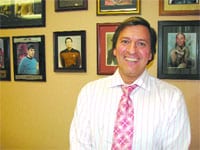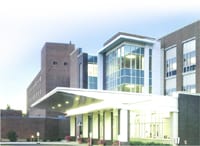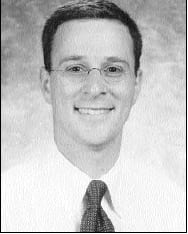Taking a Starring Role Breast Care Center Director Took His Cues from a Family Devoted to Medicine
Dr. Steven Schonholz calls it the “classic movie stars room.”
This is the examination room in Mercy Medical Center’s Breast Care Center decorated with framed signed photographs of some of Hollywood’s most fabled actors and actresses: Clark Gable, Lauren Bacall, Humphrey Bogart, Katherine Hepburn, Jimmy Stewart, Basil Rathbone as Sherlock Holmes, and Errol Flynn as Robin Hood are just a few of the many represented.
Schonholz is proud of this assortment, part of a much larger collection of photos he’s amassed over more than 20 years, but he seems more partial to another exam room’s offerings. There, he’s assembled an impressive array of actors and actresses in their roles, mostly from the ’60s and ’70s: Leonard Nimoy as Spock, Barbara Eden as Jeannie, Sean Connery as James Bond, Adam West as Batman, Diana Rigg and Patrick Macnee as the Avengers, Bruce Lee as himself, and even Gert Frobe as the classic Bond villain Auric Goldfinger.
“He’s a good test,” said Schonholz, an avid fan of the 007 movies, pointing to Frobe. “Not many know who he is; some, but not a lot.”
The photos are an effective icebreaker and conversation piece, he continued, adding that patients will point out their favorites, ask about those they don’t recognize (Frobe, early cast members from Mission Impossible, and the Thunderbirds team are on that list), make suggestions for possible additions (although Schonholz hasn’t added any in a while), and even ask how much some are worth. Meanwhile, they help relieve some of the understandable anxiety that can come with a visit to the Breast Care Center, which opened four years ago.
Relieving anxiety and helping to put patients more at ease are just some of the many things Schonholz wants to do at the center, which reflects his personality and philosophies about medicine in many intriguing ways. The photos in the rooms tell of his fondness for comic-book heroes, science fiction, and especially Star Trek (he has replicas of all the uniform insignias used in the various TV series inside a frame). Meanwhile, the books, pamphlets, and other forms of literature that seem to be everywhere speak to his commitment to educating people and making them aware of the choices they have.
Then there are some of the center’s policies and practices. These include extended hours to accommodate those who work into the early evening, a policy whereby the center commits to seeing someone within 24 to 48 hours if they have a cancer or abnormal mammogram or exam, and something called ‘detection to diagnosis in five days,’ which, as the name implies, means the center will have a pathology report within five days of a biopsy.
“I decided to run the center like I did my private practice,” he explained, referring to the office he had in Sturbridge from 1989 to 2006, when he came to Mercy. “I wanted to be available for patients, do everything we can to reduce the stress and anxiety, and get everything done as quickly as possible, but also make sure everyone knows what’s going on. That’s the way my dad was; he retired years ago and died in 2008, but he’s always with me.”
For this, the latest in its Today’s Physician series, The Healthcare News turns the spotlight on someone who apparently likes being in that position. He’s in front of a podium usually a few times a week, is a competitive swimmer (and nationally ranked), and even donned a Batman costume to appear in one of his daughter’s high-school productions.
“She came home one day and said, ‘Dad … I think this is good news … I’ve done something, and I have to tell you about it; I’ve volunteered you to play Batman in our concert,’” he recalled. “And I said, ‘oh my God, that’s fantastic.’ I rented this suit, and when the curtain went up, I had my back to the audience, I raised my arms, the cape went up … they had a girl as Catwoman, a guy as the Joker, we did fight scenes. I had a blast, and no one knew it was me.”
Casting Call
To say that medical careers run in the extended Schonholz family would be a huge understatement.
His father, the long-time associate professor of Ob/Gyn at Mount Sinai Hospital in New York, certainly influenced him, but he had plenty of other role models and sources of inspiration. His grandfather was a health care administrator, and his mother was one of the first women to ascend to a high rank in hospital administration.
“And my sister is a radiologist with a practice in New York,” he continued. “My uncle is an ob/gyn, my cousin is a psychiatrist, her husband is a gastroenterologist, my mom’s cousin used to be the head of hand surgery at Mass General. We used to get together at Thanksgiving, and I would give everyone CME credits so they could make it tax-deductible.
“It’s almost like the entire family is in medicine,” he continued. “We never had a lawyer.”
As a youth, Schonholz would often accompany his father while he did rounds at Mount Sinai. “I saw how he interacted with people, how he treated people, and how they treated him,” he said, “and that got me very interested in becoming a physician. But when I told my dad I wanted to be a doctor, he said, ‘no, I don’t want you to do it because you’ve seen me do it; I want to make sure you really like it.’
“So he set me up with a general surgeon at Mount Sinai who was originally from South Africa,” he continued. “I worked with him for the entire summer of my freshman year at college and enjoyed it so much that I worked with him for the next three years, seven days a week. That’s how I got interested in general surgery.”
Schonholz earned his bachelor’s degree at Columbia in New York, where he grew up, and his medical degree at Mount Sinai Medical School, also in New York. He did his residency at Yale New Haven Hospital, and his fellowship, focused on endoscopic training, at Mount Sinai/Case Western in Ohio. There, he garnered second place in the Cleveland Surgical Society’s competition for his research in “tonometric assessment of acute intestinal ischemia.”
And it was then that he had a career decision to make — go to work for a large university medical center like the ones he’d been trained in, or go into private practice like his father. He eventually chose the latter, and said it wasn’t a hard call.
“I really enjoy talking to people, sitting on their beds, taking time with them, without the pressure of being in a university setting and running around,” he explained. “And that’s why I decided to start my own practice.”
Nearly 17 years later, he another decision to make, and this one was a little tougher: stay in private practice or accept Mercy’s offer to direct the Breast Care Center and essentially start over. “I saw the potential of starting a breast center from scratch and doing things the way I wanted to, and decided it was the right thing to do.”
While Schonholz is a surgeon by trade, he is perhaps more noted for his work in the broad realm of education. He has spoken to a broad mix of audiences, from college students to companies’ employees; women’s groups to senior-center memberships. He says he has a real problem saying no to anyone, and thus his administrative assistant has a challenging time slotting in everything he commits to doing.
He said ‘yes’ to The Healthcare News just over a year ago, and christened the magazine’s monthly luncheon series, Food for Thought. His address that day was similar to most he’s given over the years, which are focused on empowering women through information.
“I love going out and teaching; I enjoy giving lectures to the community, and speak all over the country,” he said, adding that he touches on a number of subjects. “If someone comes up to me and says, ‘we need someone to talk on this,’ I’ll say, ‘fine, when do you want me to do it?’
“I talk about the risk, and let people know what the risk factors are and the genetic testing,” he explained. “But I also tell them that the way treatments are now and with early detection, people do very well, and people should not be scared when they do notice something, and should call and come in.”
These days, there are a number of things to occupy Schonholz’s time, and seemingly not enough hours in a day. But he essentially makes the time to do the things that are important to him.
Swimming is definitely in that category. A breaststroke specialist (what else would he be?), Schonholz competed in high school for four years and in college for one. He now competes in masters events that draw participants from across the country and even around the world, and finished first at the recent Nationals event in the 100-yard breaststroke. When not competing, he and works out regularly with a group of roughly 20 others starting at 6:15 in the morning at the Tri-Community YMCA in Southbridge, and even there he’s competing against the clock.
“I wanted to stay in shape and started swimming laps, and as other people came in, I said, ‘do you want to swim with me?’” he said while explaining how he started the masters swim team at the Y.
“We have regular practices, Monday, Wednesday, and Friday. We do workouts on the clock; it’s a lot more enjoyable when you other people to swim with; it pushes you more.”
Schonholz will also find time to give tours of Mercy’s facility to others planning to open breast-care centers, and there have been many of those over the years. And he still enjoys an occasional comic book (he had a huge collection while growing up, but gave it away to a children’s hospital at the behest of his father and grandfather), James Bond movies, and re-runs of the shows he enjoyed as a youth.
Roll the Credits
On the day he talked with The Healthcare News, Schonholz was wearing a white shirt with pink stripes and a pink patterned tie. When asked if these wardrobe choices were a nod to his work with breast cancer, he shook his head and stressed repeatedly that they weren’t.
“No, I’m just one of those guys who can truthfully say they’re comfortable wearing this color,” he said. “I have a lot of pink shirts at home; no pink pants, though.”
Schonholz seems comfortable just about anywhere — in the pool, behind a microphone, and even on stage in a Batman costume — and with most things, including his roles as parent, dog lover (two golden retrievers), physician, and educator, in no particular order.
Making patients comfortable, or more comfortable, with their condition and their choices may just be his unofficial job description. And for that, he has some help, from Bogart, Bacall, Gable, Spock, and even Mr. Goldfinger.



